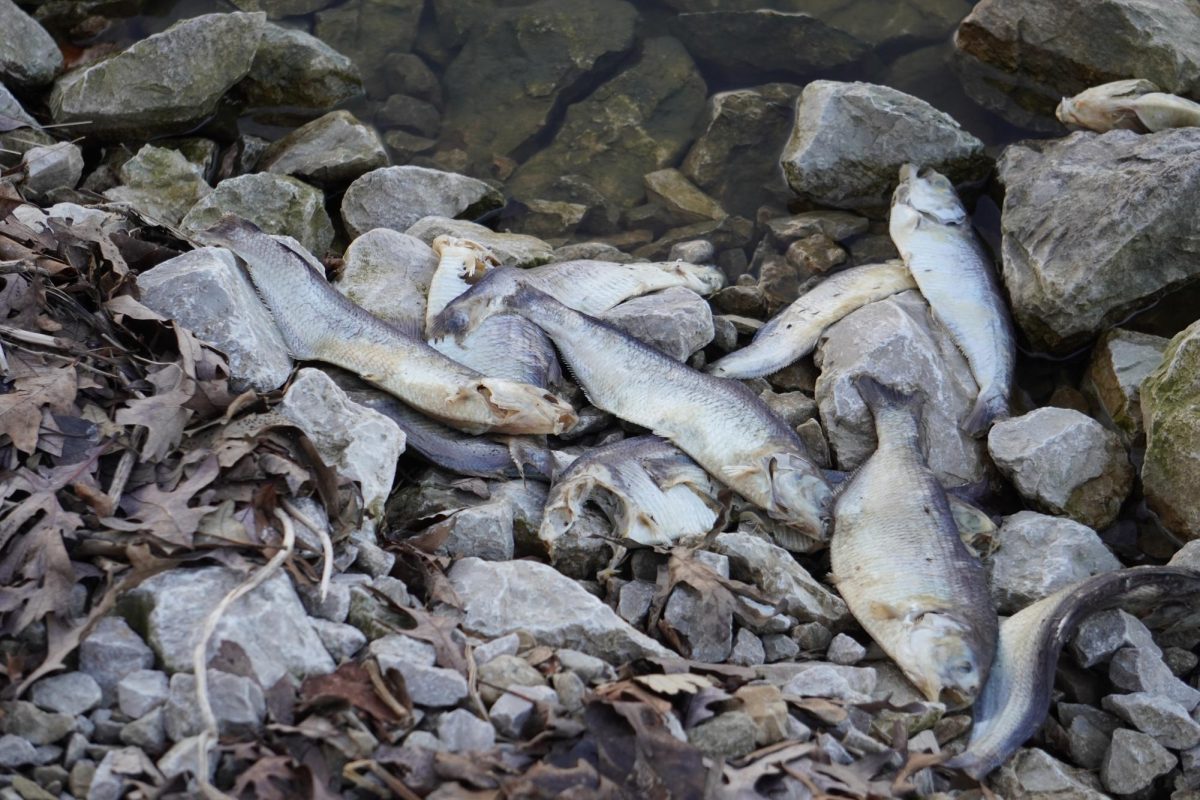One thing has been lurking when hiking around Lake Charleston over the past month: the stagnant smell of dead fish.
The odor comes from the heaps of dead fish that decomposed on the shores and lifelessly float in the water around the lake.
According to Eastern fisheries and aquatic sciences assistant professor Eden L. Effert-Fanta, the dead fish were killed by the sudden temperature drop that occurred during February.
Effert-Fanta said the majority of the fish that perished were gizzard shad. Being that central Illinois is in the northern stretch of their geographic range, a sudden drop in temperature can be lethal for gizzard shad.
Some of the dead fish will be eaten by animals and others will sink to the bottom of the lake and decompose, recycling their nutrients back into the lake, Effert-Fanta said.
The fish killed at Lake Charleston will not have any major effect on the food chain, as it was a relatively small number of fish that died, she said.
Effert-Fanta took her advanced limnology class to the lake in early February so that her students could investigate the cause of the fish kill. Besides a sudden temperature drop, low oxygen levels in the water can also lead to a fish kill.
“When there’s an extended period of time that ice covers the whole lake, especially if there is snow on the ice, it decreases the amount of light that enters the water, and so algae or aquatic plants in the lake can’t produce oxygen,” she said.
Effert-Fanta and her students determined that low oxygen was not the cause of the fish kill.
“When we went out there, the oxygen levels were quite high, and so we’re pretty confident that that is not what happened,” she said.
Ryan Skowronski, a graduate student at Eastern’s center for fisheries and aquatic sciences, was one of the students that went to the lake to investigate.
The students started with a hypothesis that the fish kill was caused by a temperature change. The students went onto the lake in a boat and utilized a measuring device to check the water temperature and dissolved oxygen levels.
“When we went out there, we collected all the data, and from all the data we [determined] that [our] hypothesis was correct,” Skowronski said.
District Fisheries Biologist for the Illinois Department of Natural Resources Jim Garavaglia said that the death of the gizzard shad from sudden winter temperature changes is not uncommon.
“[Gizzard shad] are just more prone to having mortality events during the winter, particularly when temperatures change drastically,” he said.
The amount of dead gizzard shad seen around Lake Charleston is a relatively small number when compared with how many are still alive, Garavaglia said.
Gizzard shad are also resilient to population loss. They produce a lot of eggs, which allows the species to survive even if there are mortality events among their population.
“They are able to sustain either medium to high levels of mortality without it having long impacts on the population because they are able to reproduce so much,” Garavaglia said.
According to Garavaglia, there is no indication that the fish kill was caused by pollution of the water, mainly because there was only one species of fish that was significantly affected.
When it comes to fish kills that result from pollution or lack of oxygen, there are usually pretty wide array of not only fish but even other animals that die, he said.
Garavaglia said that it would be very rare for authorities to choose to clean up a fish kill such as the one at Lake Charleston. The fish will disappear as nature runs its course.
“Nature does a pretty good job of recycling those nutrients relatively quickly,” he said.
T.J. Seputis can be reached at 581-2812 or at [email protected].










































